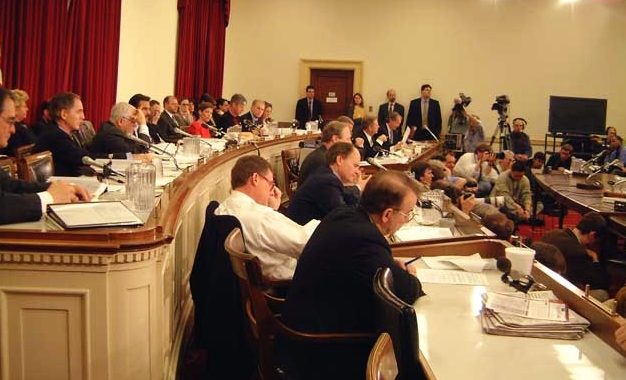From Committee To Floor Vote: Role Of The American People In The Congressional Committee Process
LISTEN ON SOUNDCLOUD:
The committee process in Congress can play a significant role in revealing true intentions of legislation so that voters, including United States House of Representatives and Senate Members, know just what each bill is about exactly, and receive opportunities especially to work out any unintended consequences before a bill gets to the House or Senate Floor for a vote.
Various committees exist in both the House and Senate on issues from Agriculture, to Homeland Security, to Small Business to Ways and Means, and more. Some committees are standing or permanent, and others are temporary such as conferences committees designed to work out differences between bill versions in the House and Senate. All can make a difference in maintaining accountability, efficiency, transparency, and integrity in America’s representative government.
Many pieces of filed legislation sent to a committee never make it out of committee for scheduling on the House or Senate Floor for a vote. When this happens, it is considered that a bill “dies in committee” because it simply gets left there and never pushed along the committee process to the point of being reported on and let out of committee to get a Floor vote for passage.
Typically, many of the problems a bill has in committee get worked out in committee before going to the Floor, but not always. Moreover, depending where the bill originates, or which chamber files the bill rather, new questions could arise altogether.
Committees are helpful in that Congress may send potential laws to them for review by the American people. Committees operate as places of explanation, and amendments may be offered to address issues that arise when witnesses come to testify in favor of or against a piece of filed legislation. Some bills sent to a committee might not receive a hearing for certain action. However, when they do, it is an opportunity for voters to learn more and engage more in the legislative process. This is especially true for controversial issues.
When people come to testify regarding legislation in a congressional committee hearing, they attend with prepared remarks, and from various backgrounds and points of view. Members who wish to vote for or against a bill that is in committee respond to constituent concerns regarding the bill. Those Members may have some constituents in favor of or against the bill come and testify by presenting their personal views during the committee hearing.
There may also be present expert witnesses who talk about parts of the legislation and what certain points mean and what could occur should the measure pass. Expert witnesses are not in attendance necessarily to agree or disagree on a bill, but to talk about specific points that will affect people, if the bill were made law.
People providing testimonies are similar to those who testify in court. They come to a set committee hearing, and are “heard” by House or Senate Members, and other constituents, voters. As testimony is provided through time allotments per person, decisions are made as to whether amendments should be made to the bill while it is in committee.
It seems that bills should be able to get figured out during the committee process, but this does not always happen. Bills may get to the House or Senate Floor and still need amendments. It is possible to offer amendments throughout the legislative process which is helpful as something could be missed during committee.
Sometimes it is best to get to a certain point in committee and then Members working to pass the bill, get it out of committee to the Floor for a vote, as is. However, those in support must take care that the bill is checked for concerns that might cause results that were not anticipated. This means Members and their staffs need “run their traps” by working with their constituents –voters, on bills through the committee process, and other means of clear communication, to be sure everything is clarified and understood as to what the bill does and does not do.
This is where the checks and balances of America’s constitutional governing systems are especially important. It is also why the legislative process should not be super easy to navigate. If the process is rushed through, the cost is too high in time, tax dollars, and efforts to repeal later down the line.
Amanda Hughes serves as Outreach Director, and 90 Day Study Director, for Constituting America. She is the author of Who Wants to Be Free? Make Sure You Do!, and a story contributor for the anthologies Loving Moments(2017), and Moments with Billy Graham(forthcoming).
Sources:
“The Original Meaning of the Origination Clause”
https://judiciary.house.gov/wp-content/uploads/2016/01/114-54_98282.pdf
“United States House of Representatives – “House Floor Consideration”
https://www.house.gov/the-house-explained/the-legislative-process/house-floor
“Congressional Research Reports”
http://congressionalresearch.com/
United States House of Representatives – “Committees”
https://www.house.gov/committees
“House Committee Hearings: Witness Testimony”
http://congressionalresearch.com/98-338/document.php?study=House+Committee+Hearings+Witness+Testimony
“Senate Committee Hearings: Arranging Witnesses” http://congressionalresearch.com/98-336/document.php?study=Senate+Committee+Hearings+Arranging+Witnesses
United States Senate – “Committees”
https://www.senate.gov/committees/committees_home.htm




Thank you.
It may be an flawed conclusion, but must Americans believe that Congress is only interested in hearing from those connected with Congress. Lobbyists who under write elections, famous people who get in the line light, rich and influential. This may be incorrect. But it is widely believed.
PSD